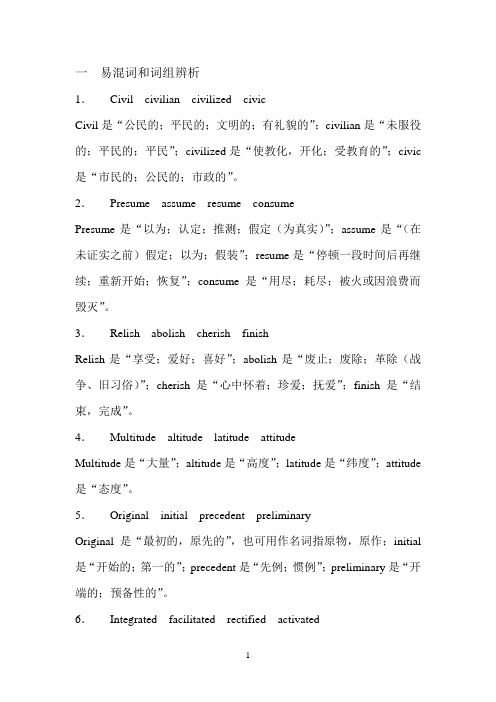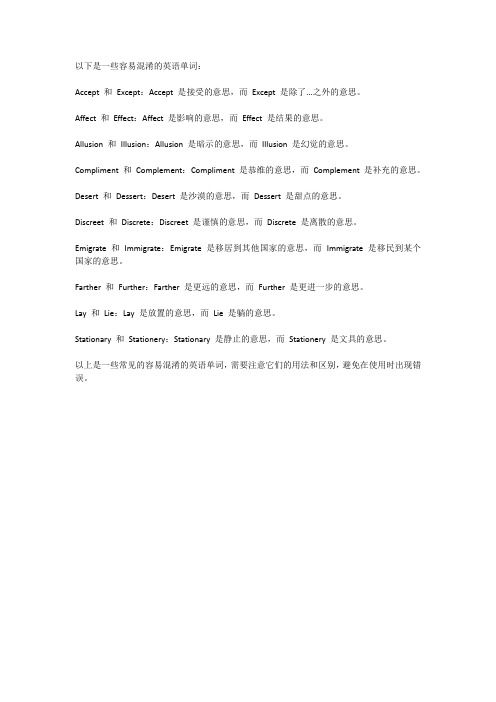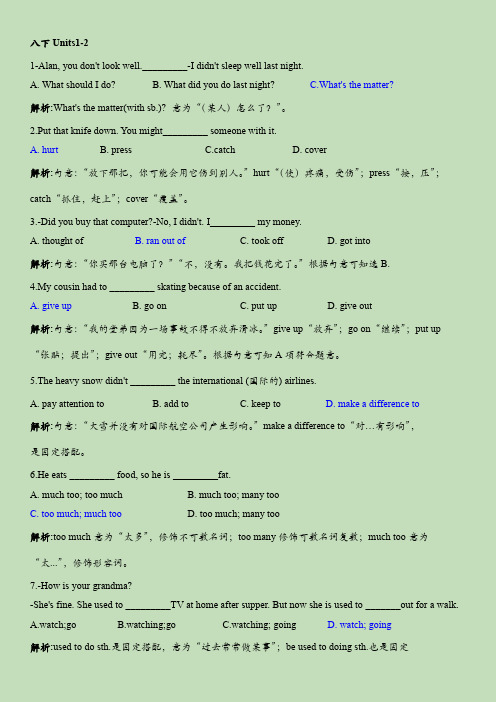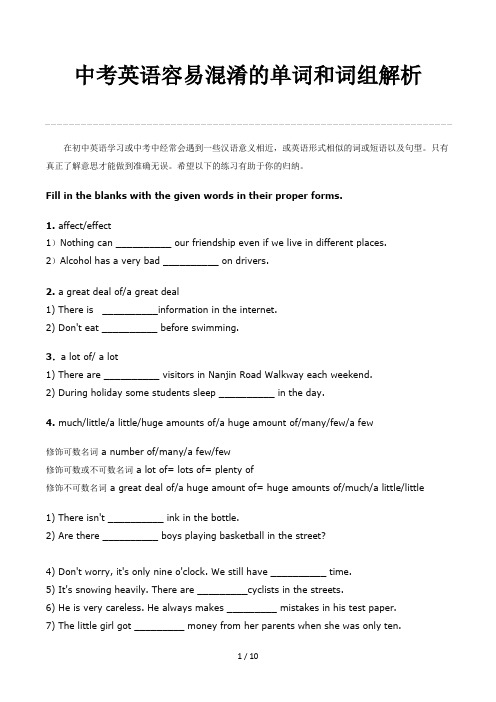容易混淆的单词和词组解析-答案
(完整版)易混词和词组辨析参考资料

一易混词和词组辨析1.Civil civilian civilized civicCivil是“公民的;平民的;文明的;有礼貌的”;civilian是“未服役的;平民的;平民”;civilized是“使教化,开化;受教育的”;civic 是“市民的;公民的;市政的”。
2.Presume assume resume consumePresume是“以为;认定;推测;假定(为真实)”;assume是“(在未证实之前)假定;以为;假装”;resume是“停顿一段时间后再继续;重新开始;恢复”;consume是“用尽;耗尽;被火或因浪费而毁灭”。
3.Relish abolish cherish finishRelish是“享受;爱好;喜好”;abolish是“废止;废除;革除(战争、旧习俗)”;cherish是“心中怀着;珍爱;抚爱”;finish是“结束,完成”。
4.Multitude altitude latitude attitudeMultitude是“大量”;altitude是“高度”;latitude是“纬度”;attitude 是“态度”。
5.Original initial precedent preliminaryOriginal是“最初的,原先的”,也可用作名词指原物,原作;initial 是“开始的;第一的”;precedent是“先例;惯例”;preliminary是“开端的;预备性的”。
6.Integrated facilitated rectified activatedIntegrated是“使变成一体,使结合在一起”,常和with或into搭配;facilitated是“使变得容易,使便利”;rectified是“纠正;修复”;activated 是“使活动起来;使开始起作用”。
7.Enforce enhance endow entailenforce是“实施,执行”;enhance是“提高(质量、价值、吸引力等);增加,增强,增进”;endow是“给予,赋予;认为......具有某种特征;资助,捐赠”;entail是“使人承担;使成为必要,需要”。
容易混淆的英语单词

以下是一些容易混淆的英语单词:
Accept 和Except:Accept 是接受的意思,而Except 是除了...之外的意思。
Affect 和Effect:Affect 是影响的意思,而Effect 是结果的意思。
Allusion 和Illusion:Allusion 是暗示的意思,而Illusion 是幻觉的意思。
Compliment 和Complement:Compliment 是恭维的意思,而Complement 是补充的意思。
Desert 和Dessert:Desert 是沙漠的意思,而Dessert 是甜点的意思。
Discreet 和Discrete:Discreet 是谨慎的意思,而Discrete 是离散的意思。
Emigrate 和Immigrate:Emigrate 是移居到其他国家的意思,而Immigrate 是移民到某个国家的意思。
Farther 和Further:Farther 是更远的意思,而Further 是更进一步的意思。
Lay 和Lie:Lay 是放置的意思,而Lie 是躺的意思。
Stationary 和Stationery:Stationary 是静止的意思,而Stationery 是文具的意思。
以上是一些常见的容易混淆的英语单词,需要注意它们的用法和区别,避免在使用时出现错误。
高中易混淆单词及词组

He makes a regular visit to his parents.他定期看望他的父母。
Alice is a common name in English.在英语中艾丽斯是一个常见名。
Shall we meet at the usual time and place?我们还在通常的时间和地点见面吗?What is the normal body temperature?人的正常体温是多少?She had on an ordinary dress.她穿着一件很普通的衣服。
Exercise:1.A new__________bus service to Tianjin Airport started to operate two months ago.A.normalualC.regularmonIt is probable,not possible,that he will be late.他会迟到不是很可能,而是非常有可能。
It is possible for him to attend the speech.他可能参加这次演讲。
It is probable that he has left.他很可能已经离开。
He is likely to come here tonight.他今晚可能要来这儿。
Exercise:1.It is_________that he has been addicted to the drugs and has difficulty quitting it.A.apparentlyB.obviously D.possibly D likely2.Studies show that people are more_____to suffer from back problems if they always sit before computer screens for long hours.A.likelyB.possibleC.probable D .sureLet’s keep the fish alive.(作宾补)让这条鱼活着吧。
八年级下学期易错单词短语练习与解析(有答案)20202021学年人教版八升九英语(新九年级)5

八下Units1-21-Alan, you don't look well._________-I didn't sleep well last night.A. What should I do?B. What did you do last night?C.What's the matter?解析:What's the matter(with sb.)? 意为“(某人)怎么了?”。
2.Put that knife down. You might_________ someone with it.A. hurtB. pressC.catchD. cover解析:句意:“放下那把,你可能会用它伤到别人。
”hurt“(使)疼痛,受伤”;press“按,压”;catch“抓住,赶上”;cover“覆盖”。
3.-Did you buy that computer?-No, I didn't. I_________ my money.A. thought ofB. ran out ofC. took offD. got into解析:句意:“你买那台电脑了?”“不,没有。
我把钱花完了。
”根据句意可知选B.4.My cousin had to _________ skating because of an accident.A. give upB. go onC. put upD. give out解析:句意:“我的堂弟因为一场事故不得不放弃滑冰。
”give up“放弃”;go on“继续”;put up “张贴;提出”;give out“用完;耗尽”。
根据句意可知A项符合题意。
5.The heavy snow didn't _________ the international (国际的) airlines.A. pay attention toB. add toC. keep toD. make a difference to解析:句意:“大雪并没有对国际航空公司产生影响。
中考英语容易混淆的单词和词组解析

在初中英语学习或中考中经常会遇到一些汉语意义相近,或英语形式相似的词或短语以及句型。
只有真正了解意思才能做到准确无误。
希望以下的练习有助于你的归纳。
Fill in the blanks with the given words in their proper forms.1. affect/effect1)Nothing can __________ our friendship even if we live in different places.2)Alcohol has a very bad __________ on drivers.2. a great deal of/a great deal1) There is__________information in the internet.2) Don't eat __________ before swimming.3.a lot of/ a lot1) There are __________ visitors in Nanjin Road Walkway each weekend.2) During holiday some students sleep __________ in the day.4. much/little/a little/huge amounts of/a huge amount of/many/few/a few修饰可数名词 a number of/many/a few/few修饰可数或不可数名词 a lot of= lots of= plenty of修饰不可数名词 a great deal of/a huge amount of= huge amounts of/much/a little/little1) There isn't __________ ink in the bottle.2) Are there __________ boys playing basketball in the street?4) Don't worry, it's only nine o'clock. We still have __________ time.5) It's snowing heavily. There are _________cyclists in the streets.6) He is very careless. He always makes _________ mistakes in his test paper.7) The little girl got _________ money from her parents when she was only ten.5. a number of/the number of1) _________ the students in this school is one thousand two hundred and eleven.2) _________ people have applied for this job.6. aboard/abroad1) Do you want to go__________ to further your study when you grow up?2) Look, Stone is already __________the ship.7. agree with/agree to1) Do you ________ me about the plan?2) We all _________ the arrangement.8. alive/living1) The dying man over there is still __________.2) All _______ things can't live without air or water.9. all of/none of/both of/neither of/either of/some of/many of/few of/much of1) _________ us have to go to school at the age of eight.2) __________ the two answers is correct.3) In China _________ the pilots was woman many years ago.4) I don't want _________ the two scarves. Please show me another.5) ________ my parents got retired and lived with my younger brother in Japan.6) ________ the students like to see that film.7) ________the boys like playing basketball.10. alone/lonelyMy grandpa lives___________ , but he has a lot of friends, so he never feels11. answer/reply1) Can you __________ this question right now?2) What did he do in ____________ to your challenge?12. at table/at the table1) The man sitting _________ is the new manager of this restaurant.2) Children must learn to behave _________.13. be familiar to/be familiar with1) I am not very __________ pop singers.2) Our national anthem ___________ each of the students, even the kids in nurseries.14. full/fill1) Will you please __________ in this form with a pen?2) She was ___________of news. That means she couldn't stop herself talking about it.15. be located/stand/lie1) Shanghai __________ in the east of China.2) That quiet small town is __________ at the foot of the mountain.3) A clock __________ on the sideboard was an antique.16. be made of/be made from/be made in1) This watch _________ Japan in 2002.2) Bread _________ wheat.3) The blackboard _________ glass and wood.17. beat/win1) Mum always _________ me when we played chess before I was eight years old.2) To my surprise, two of the students in our school _________ the first prize in the English contest this year.3) He _________ me at table tennis yesterday.18. beside/besides/except/except for2) The girl sitting _________ Ms. Green is from Singapore.3) We have seven lessons every day_________ Saturday and Sunday.4) All the students attended the lecture _________ the teachers.19. borrow/lend/keep1) Could you tell me how long I can _________ the VCD?2) I have no MP3, may I _________ yours?3) You'd better not _________ my laptop to others.20. bring/take/fetch/carry1) Would you please _________ your umbrella in the next room. It's raining outside. 2) Remember to _________ your homework tomorrow.3 ) It's getting windy, you'd better _________ a coat with you while you are out.4) Light trains always _________ plenty of people to and from work in rush hours.21. cabbage/fish1) I bought lots of ___________ yesterday.2) ___________ was served after the first course.3) They caught several frogs, crabs and ___________ in the river yesterday.4) I think you'd better eat some more ___________ vegetables are good for you.22. can/may/must2) ___________ I have a look at your photos?3) I thought I ___________ smell something burning.23. die of/die from1) Nowadays more people ___________ car accidents on high ways.2) In fact the little baby ___________ a fever last night.24. drop/fall1) The vase ___________ and broke.2) Jenny's voice ___________ as the class teacher entered the classroom.25. elderly/elder/older1) Air pollution can cause respiratory problems, especially in children and the___________.2) My ___________ brother is ten years ___________ than I.26. electricity/electric/electrician/electronic/electrical1) Make sure that lights and other ___________ appliances are turned off when not needed.2) Avoiding using ___________ dictionary while doing some reading.3) Simon's father used to be an ___________.4) I got an ___________ shock from that faulty light switch when I was fourteen.5) Don't leave the TV on, it wastes ___________.27. excited/excitingAll of us were ___________ at the ___________ news yesterday.28. fall/feel1) The doctor ___________ my forehead and said, "You have got a high fever. "2) Many trees ___________ in the sand storm last night.29. asleep/sleepy/sleep/sleeping1) The driver felt ___________ last night, so he fell ___________as soon as he lay in bed.2) When do you go to ___________every day?3) I took a ___________-car to Beijing last Friday.30. find out/find/discover/invent/look for/search for1) Columbus ___________America in 1492.2) Do you know who first ___________clock?3) Jane ___________her key to the drawer everywhere just now, but she couldn't___________it.4) Please try to ___________who broke the window.5) The police ___________the criminals for hours this morning.teCnon":1"DIton1{C"{etn:D"tI参考答案与解析1.affect是一个动词,它的意思为“影响、感染”。
大学英语四级考试易混淆词语的归纳

大学英语四级考试易混淆词语的归纳大学英语四级考试中,存在许多易混淆的词语,考生需要对这些词语进行归纳和掌握,以避免在考试中出现错误。
以下是一些常见的易混淆词语及其区别解析。
1.affect和effect affect是动词,意为“影响”,常用于描述某种因素对某物产生的影响。
例如:The weather affected our travel plans.(天气影响了我们的旅行计划。
) effect是名词,意为“效果”或“结果”,常用于描述某种原因或因素所产生的结果。
例如:The new policy had apositive effect on the economy.(新政策对经济产生了积极的效果。
)2.advice和advise advice是名词,意为“建议”,常用于表示对他人的建议或意见。
例如:I need some advice on how to study effectively.(我需要一些建议,关于如何有效地学习。
) advise是动词,意为“建议”或“劝告”,常用于表示给他人提出建议或提供指导。
例如:I would advise you to take a break and relax.(我建议你休息一下,放松一下。
)3.choose和choice choose是动词,意为“选择”,常用于表示在多个选项中做出决定。
例如:I can't decide which dress to choose for theparty.(我无法决定在派对上穿哪条裙子。
) choice是名词,意为“选择”,常用于表示可供选择的事物或情况。
例如:We have a wide range of choices for dinner tonight.(今晚晚餐我们有很多选择。
)4.hear和listen hear是动词,意为“听到”,强调听觉的感知。
例如:Iheard a strange noise coming from the next room.(我听到了一阵奇怪的声音从隔壁房间传来。
专四词汇语法易错
专四词汇语法易错一、易混淆词汇。
1. affect (əˈfekt) - 动词。
- 意思:影响;(疾病)侵袭;使感动。
- 例句:The bad weather will affect our travel plans.(恶劣的天气将影响我们的旅行计划。
)- 易错点:容易和“effect (ɪˈfekt) - 名词/动词”混淆。
“effect”作名词时意思是“影响;效果”,如:The new law has had a positive effect on the environment.(新法律对环境有积极的影响。
)作动词时表示“使发生;实现”,例如:They hope to effect a change in the system.(他们希望在这个系统中实现变革。
)2. principal (ˈprɪnsəpl) - 形容词/名词。
- 形容词意思:主要的;最重要的。
名词意思:校长;本金。
- 例句:The principal reason for his absence is illness.(他缺席的主要原因是生病。
)The principal of the school is very strict.(这所学校的校长非常严格。
)- 易错点:与“principle (ˈprɪnsəpl) - 名词”混淆,“principle”的意思是“原则;原理”,如:We should stick to our principles.(我们应该坚持我们的原则。
)3. compose (kəmˈpəʊz) - 动词。
- 意思:组成;创作(音乐、文学作品等);使平静。
- 例句:Water is composed of hydrogen and oxygen.(水由氢和氧组成。
)He can compose beautiful music.(他能创作优美的音乐。
)- 易错点:容易和“comprise (kəmˈpraɪz) - 动词”弄混。
容易混淆的单词
容易混淆的单词compliment 赞美;complement 附加物confirm 确认;conform 使顺从contact 接触;contract 合同;contrast 对照council 会议;counsel 忠告;consul 领事crow 乌鸦,crown 王冠;clown 小丑;cow 牛dose 一剂药;doze 打盹drawn (draw 过去分词)画画;drown 溺水reserve 预订,保存;deserve 应受,应得,值得;preserve 保护,保存;observe 观察arouse 激起,引起;around 四处,到处rise 上升,上涨;raise 提高,举起;arise 发生,出现plan 计划;plant 种植;planet 行星lack 缺乏,不足,没有;black 黑,黑色;blank 空白的,茫然的continuous 联系不断;continue 连续的;constant 不变,持久melt (使)融化;meat 肉stain 玷污,污点;rain 下雨shave 剃,刮;shade 阴暗处vice 罪恶,缺点;nice 美好chop 砍,排骨;chopsticks 筷子;shop 商店silk 丝,丝织品;silly 傻的,愚蠢的;milk 牛奶live 现场的,直播的;living 在世的,逼真的;alive 活的;lively 生动的,活泼的inspiration 灵感;aspiration 志向,抱负latitude 纬度;altitude 海拔,高度;gratitude 感激之情,谢意;attitude 态度,看法;multitude 大批,许多vocation 工作职业;vacation 假期容易混淆的单词如下:frown 皱眉;brow 褐色的mass 多;mess 凌乱状态,脏乱statue 塑像,雕像;status 身份bride 新娘;pride 骄傲clash 发生冲突;crash 碰撞grant 授予,给予;grand 宏伟的staff 工作人员;stuff 材料,东西;stiff 硬的,不灵活的emergency 紧急情况;emerge 出现;urgency 紧急include 包括;exclude 把······排除在外embassy 大使馆;ambassador 大使,使节sponsor 发起者,发起;spoon 勺子punch 猛击;pinch 捏,拧;bunch 群,伙steamer 轮船,汽船;steam 蒸汽;steam 茎,干,起源;team 队,组scancel 撤销;scandal 丑事,丑闻steep 险峻的,陡峭的;step 阶梯steer 引导,驾驶;steel 钢铁nest 巢,窝;rest 休息chest 胸腔,胸膛;cheat 作弊rebel 反叛分子,反叛;bell 战争render 使得,致使,提供;lender 出借人;tender 温柔的;slender 细长,苗条sight 看见;slight 轻微的bench 长凳,工作台;branch 分支,分部push 推动;rush 迅速移动,急速rug (小)地毯;hug 拥抱fame 名声,名望;name 名字resume 恢复,重新开始;consume 消费,吃完impression 印象,印记;depression 抑郁,不景气drunk 醉的,陶醉的;drink 喝barrier 删栏,检票口;carrier 运输工具stocking 长袜;stock 原料,储备,家畜;stick 粘住;stack 商品latter 两者中的后者;later 更迟的;letter 信royal 王室的,皇家的;loyal 忠诚的stoop 俯身,弯腰;stood 站立calendar 日历;slender 苗条debate 争论,辩论;bate 减轻,软化第一组容易混淆的单词:Australia 澳大利益Austria 奥地利一个是大洋洲国家,一个是欧洲国家,千万不要搞错了。
易混淆的英语单词词组
易混淆的英语单词词组affect/effect① affect (v.):影响eg:Smoking affects health.抽烟影响健康。
② effect (n.):效果,影响eg:Government policy will not have any effect on us.政府的政策不会对我们有任何影响。
continuous/continual① continuous:持续不断的(可以做表语和定语)eg:continuous pain持续的疼痛(疼痛一直有)② continual:不停的(中间有间隔的重复,只能做定语)eg:continual improvements in technology技术上的不断进步(进步是间隔性的)conserve/preserve① conserve (v.):保存,保藏,保护(强调节约)。
eg:In winter, some people conserve energy by lowing the heat at night.冬天,为节约能源有些人在夜里把暖气调小。
② preserve (v.):保护;维持;保养;防止(食物)腐败(强调使不受破坏)。
eg:The government preserves the rights of the individual person. 政府保护个人的权利不受侵犯。
sensitive/sensible① sensitive:敏感的、感觉的、易受影响的,tive一般表特性。
eg:a sensitive topic 敏感话题② sensible:明智的、合乎情理的、通情达理的、意识到的、能感觉到的,able一般表能力。
eg:a sensible young woman 明智的姑娘eg:sensible of his fault 意识到他的错误incredible/incredulous① incredible:不可相信的,难以置信的eg:incredible energy惊人的能量,精力。
四级英语100组易混淆的英语词汇
100组易混淆的英语词汇1. able, capable, competentable为常用词,指具有做某事所需的力量,技巧,知识与时间等,一般下效率无关,用作定语表示能力超出平均水平。
如:A cat is able to see in the dark.capable 指满足一般要求的能力,可以是表现出来的,也可是潜在的,搭配是be capable of +doing。
用作定语,表示的能力没有able表示的能力强。
如:He is capable of runninga mile in a minute. He is a very capable doctor.competent 指“胜任”,“合格”,或受过专业技术等训练的,但不是超群的能力。
如:A doctor should be competent to treat many diseases.2. aboard, abroad, board, broadaboard 在船(或飞机,车)上。
如:I never went aboard a ship.abroad 副词,在国外或海外。
如:He often goes abroad.board 为动词,上(船,飞机,车)。
如:The passengers are boarding the plane now.broad 为形容词,宽广的。
如:He has very broad shoulders.3. accomplish, complete, finish, achieve, attainaccomplish表成功,强调完成的结果而不是过程。
如:Because of his hard word, things are accomplished. (由于他的努力,事情都已完成了。
)complete 表示积极的完成,更具体地指建筑、工程等的完成。
如:Has he complete his novel yet? (他的小说写完了吗?)finish 最常用,后接动词的-ing形式,表示在一个活动的连续过程中完成了最后的一步或阶段。
- 1、下载文档前请自行甄别文档内容的完整性,平台不提供额外的编辑、内容补充、找答案等附加服务。
- 2、"仅部分预览"的文档,不可在线预览部分如存在完整性等问题,可反馈申请退款(可完整预览的文档不适用该条件!)。
- 3、如文档侵犯您的权益,请联系客服反馈,我们会尽快为您处理(人工客服工作时间:9:00-18:30)。
参考答案与解析1.affect是一个动词,它的意思为“影响、感染”。
而effect是个名词。
1) 从整个句子来看缺少了一个主语,情态动词can后面要加动词原形。
所以答案是affect。
2) have an effect on...的意思为“对……有效应…‘对……有结果”。
所以答案是effect。
2.a great deal of解释为“许多、大量”,用来修饰不可数名词。
而a great deal的意思为“大量”,用来修饰动词。
1) 由于information是一个不可数名词,所以答案是a great deal of。
2) 游泳前不要吃得太多。
swim是一个动词,所以答案是a great deal。
3.a lot of解释为“许多、大量”,用来修饰名词(可数/不可数)。
而a lot的用法和意思与a great deal基本相同。
1) visitors是可数名词的复数形式,所以答案是a lot of。
2) swim是一个动词,所以这题的答案是a lot。
4. little,a little,mt.ch,huge amounts of都是用来修饰不可数名词的,只是多少的程度不同。
Few,a few,many则是用来修饰可数名词的,也只是多少的程度不同。
1) ink是不可数名词,这句句子又是否定的意思,所以答案是much。
2) boys是可数名词的复数形式,这句句子又是一般疑问句,所以答案是many。
3) 整个句子的意思为“赶快!没什么时间了。
”所以答案是little。
4) 这个句子的意思为“别担心,只有九点,我们还有一些时间。
”所以答案是a little。
5) 整个句子的意思为“正在下大雪,街上几乎没有什么骑车的人。
”所以答案是few。
6) mistakes是可数名词的复数形式,整个句子的意思为“他很粗心,经常在测验时出错。
”所以答案是a few。
7) money是一个不可数名词,可以用much,a great deal of,huge amounts of,a huge amount of,a little,little来修饰。
从这个句子的意思,答案是huge amounts of,a huge amount of较为确切。
5.a number of解释为“许多、大量”,用来修饰可数名词的复数形式。
而the number of 解释为“……的数量”,后面的动词一定要用单数形式。
1) 这句句子的动词为is,整个句子的意思为“这个学校学生的数量为1211人。
”所以答案是The number of。
2) 这句句子的动词是have applied for,整个句子的意思为“有许多人申请了这份工作。
”所以答案是A number of。
6.abroad的意思为“出国、在国外、到国外”;而aboard的意思为“在船、飞机、火车或公共汽车上”。
1) 这个句子的意思为“长大后去国外继续深造。
”所以答案是abroad。
2) 这个句子的意思为“看,斯通已经上船了。
”所以答案是aboard。
7.agree with sb.解释为“同意赞成某人的观点”;而agree to解释为“同意某事”1) 这个句子意思为“关于这个计划你同意我的提议吗?”所以答案是agree with。
2) “我们都同意这个安排”是整个句子的意思。
所以答案是agree to。
8.alive是一个形容词,解释为“活着、没死”,常常跟在be动词的后面;而living也是一个形容词,但它只可以用作定语,用来修饰名词。
1) is是be动词,所以答案是alive。
2) things是一个名词,所以答案是living。
9.1) 在中国每个孩子都应该享受到义务制教育,All of解释为所有的,所以答案是All of。
2) two answers表示两个,而动词又是单数形式。
所以答案是Neither of。
3) none of是all of的否定形式,许多年前没有一个女飞行员。
这是完全否定,所以答案是none of。
4) 这句句子的意思为“这两条围巾我都不喜欢,再拿其他的给我看看。
”由于否定已出现在动词部分,不能再用neither。
所以答案是either of。
5) 一般情况下一个人的双亲是指父亲和母亲。
而both of解释为“两个都……”所以答案是Both of。
6) few of解释为“很少有人”这个句子的意思为“很少有学生看那部电影。
”所以答案是Few of。
7) some of一些人,many of许多人。
由于姚明及NBA篮球在男孩中很受欢迎,所以答案是Some of或Many of。
10.alone解释为“无伴、独自、单独”而lonely的意思为“孤独的、寂寞的”这个句子的意思为“我的祖父独自住,但是他有许多好朋友,所以他从来不感到孤独。
”所以答案是alone,lonely。
11. 1) answer the question的意思为“回答问题”,所以答案是answer。
2) reply to sth/sb.的意思也是“答复……事/答复……人”,in reply to sb. /sth.中的reply是用作名词,解释为“答复、回答”整个句子的意思为”你向他挑战,他作何反应。
”所以答案是reply。
12.at the table的意思为“坐在桌旁”,而at table解释为“就餐”。
1)这句句子的意思为“坐在桌旁的男子是这饭店新来的经理。
”所以答案at the table。
2)“孩子们必须学习就餐时的礼仪”是这句句子的意思。
所以答案是at table。
13.be familiar with sth.解释为“对某事熟悉、通晓”,而be familiar to sb.解释为“为人所熟知的”。
1)这句句子的意思为“我对流行歌手不是很熟。
”所以答案是familiar with。
2)此句的意思为“国歌是为人所熟知的,即使是幼儿园的孩子们。
”所以答案是is familiar to。
14. 1)fill是一个动词解释为“装满、填满”。
fill in the form是填写表格的意思。
所以答案是fill。
2)full是一个形容词,解释为“满的、充满的”。
be full of的意思为“充满”。
所以答案是full。
15. 1ie解释为“位于”。
be located in/on/at解释为“将某物设置在某处、使坐落于”,常常使用被动语态。
stand解释为“使某物放置、直立”。
1)此句的意思为“上海位于中国的东面。
”所以答案是lies。
2)此句的意思为“安静的小镇坐落于山脚下,”句中已有is,所以答案是located。
3)此句的意思为“直立在餐桌旁的钟是件古董。
”所以答案是standing。
16.be made in的意思为“由……制造”;be made from的意思为“由……制成”。
(但不能看出原材料本身);be made of的意思也是“由……制成”。
(但能看出原材料本身)1)这只手表是2002年日本制造的。
所以答案是was made in。
2)此句的含义为“面包是由小麦制成的,”从面包的外表看不出小麦的样子。
所以答案是is made from。
3)此句的含义为“黑板是由玻璃和木头制成的。
”所以答案是is made of。
17.1) beat sb.的一种意思为“揍……”,另一种为“打赢某人、打败某人、胜过某人”。
所以答案是beat。
注意beat的过去时也是beat。
2) win的意思为“在战斗、比赛中赢、获胜”。
所以答案是won。
3) beat sb. at sth.的意思为“打赢某人、打败某人、胜过某人”。
所以答案是beat。
18.except解释为“除了某人、某事之外(表示所说的不包括在内)”;但except for的前后是从属关系。
beside的意思为“在……旁边”;except解释为“除了某人、某事之外(表示所说的不包括在内)”;besides的意思为“除了某人、某事之外还有……”1)此句的意思为“这篇作文除了一个拼写错误,其他都很好。
”所以答案是except for。
2)此句的意思为“坐在格林旁边的女孩来自新加坡。
”所以答案是beside。
3)由于星期六和星期天是不用上学的,所以答案是except。
4)此句的意思为“除了老师们还有全体学生参加了讲座。
”所以答案是besides。
19.keep意思为“保持”;borrow是借(入)的意思,lend的意思为“借(出)”1) how long表示多久,不能与瞬间动词一起用,此句的意思为“这盘VCD我能借多久?”所以答案是keep。
2)此句的意思为“我没有MP3,我能借你的吗?”所以答案是borrow。
3)此句的意思为“你最好不要把我的手提电脑借给别人。
”所以答案是lend。
20.fetch的意思为“取来某物”;bring的意思为“带着某物来”,take是指“携带、运载或伴随某人/某物”;carry是指“运送某人、某物”。
1)根据此句的含义,答案是fetch。
2)而这句句子的意思为“明天别忘了把你的作业带来。
”所以答案是bring。
3)根据上下文的意思,答案是take。
4)上海的轨道交通在上下班高峰时运送大量的乘客。
所以答案是carry。
21.cabbage和fish这类词,在煮熟之前是可数的,但做成菜以后就是不可数了。
1)此句的含义为“昨天我买了许多大白菜”,所以答案是cabbages。
2)此句的含义为“鱼是上的第二道菜”,所以答案是Fish。
3)此句的含义为“昨天他们在河里抓了些青蛙、螃蟹和一些鱼”,答案是fishes,因为指各种不同的鱼。
4)此句的含义为“我认为你最好多吃些卷心菜。
蔬菜对你有好处。
”所以答案是cabbage。
22.can表示一种能力;may表示一种可能性;must表示一种责任。
1)此句的含义为“当我们使用计算机时,我们必须按照用法说明。
”所以选must。
2)此句的含义为“我可以看一下你的照片吗?”所以答案是May。
3)此句的含义为“我想我能闻到东西烧焦了。
”所以答案是could。
23.die of是指自然死亡,die from而是指死于天灾人祸1)此句的含义为“现在更多的人死于公路上的车祸。
”所以答案是die from。
2)此句的含义为“事实上那个小孩昨晚死于高烧。
”所以答案是died of。
24. drop的意思为“使某物落下”,而fall的意思为“落下、跌下,(强度)变弱”1)此句的意思为“花瓶落了下来,碎了。
”所以答案是fell。
2)此句的含义为“当老师进入教室的时候,詹尼的声音小了下来。
”所以答案是dropped。
25. elderly= aged是指老年人,elderly较为客气、尊重;elder是指(人,尤其是家庭中两个关系密切的成员)年龄较大的,年长的,用作定语;older用于人或事物,常用在比较级中。
